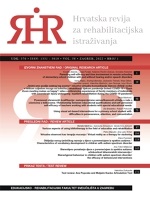Parenting self-efficacy and time involvement in remote schooling of elementary school children with and without hearing and/or speech disorders
Parenting self-efficacy and time involvement in remote schooling of elementary school children with and without hearing and/or speech disorders
Author(s): Koraljka Bakota, Lucija Punjek, Katarina Pavičić Dokoza, Gordana KerestešSubject(s): School education, Health and medicine and law, Inclusive Education / Inclusion, Sociology of Education, Distance learning / e-learning, Pedagogy
Published by: Sveučilište u Zagrebu, Edukacijsko-rehabilitacijski fakultet
Keywords: COVID-19 pandemic; parents; elementary school children; remote schooling; hearing and/or speech disorders;
Summary/Abstract: During the COVID-19 pandemic, remote schooling was conducted on several occasions in the Republic of Croatia. The aim of this study is to compare the remote schooling experiences of parents of elementary school children with hearing and/or speech and language disorders and those of parents of typically developing children during the COVID-19 pandemic. Parental time involvement and predictors of general parenting self-efficacy were examined using two online surveys based on the same questionnaire. The first survey involved 267 parents of typically developing children, while the second involved 109 parents of children with hearing and/or speech and language disorders. Data were analysed using chi-square tests and hierarchical regression analysis. Our results show that, on working days and on weekends, parents of children with developmental disorders invested significantly more time in their child’s remote schooling than parents of typically developing children. Furthermore, higher general parenting self-efficacy was reported by parents who had more children, those whose children were more independent regarding remote schooling, those whose children did not suffer from developmental disorders, as well as those who experienced less stress due to their child’s remote schooling. Our study highlights the importance of adapting the remote schooling model based on the different needs and abilities of students, as well as the requirements of their families in order to prevent low parenting self-efficacy and improve students’ educational achievements.
Journal: Hrvatska revija za rehabilitacijska istraživanja
- Issue Year: 58/2022
- Issue No: 1
- Page Range: 1-18
- Page Count: 18
- Language: English

